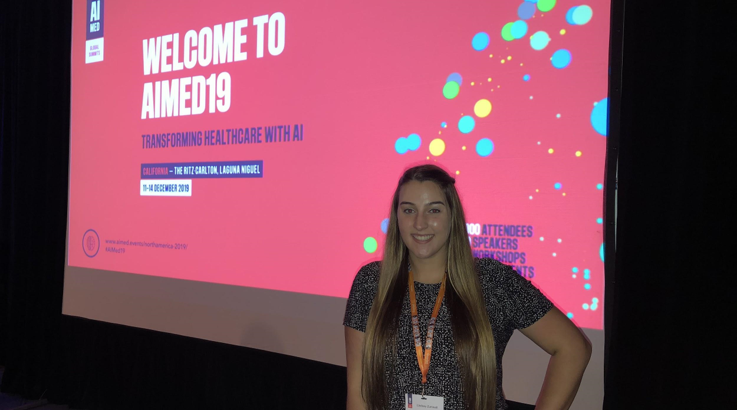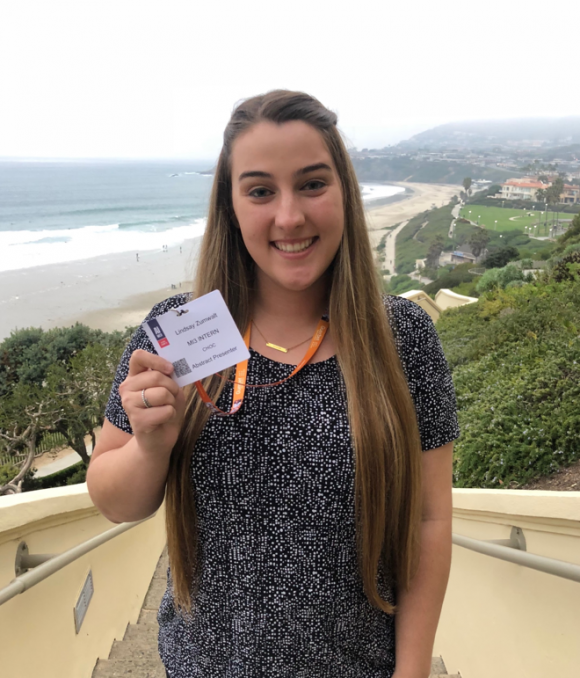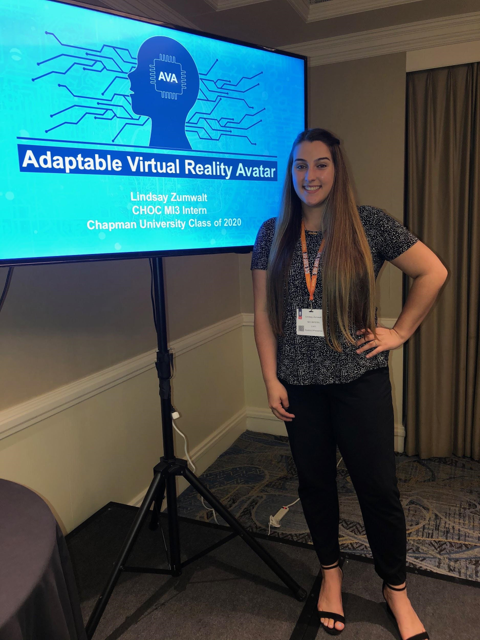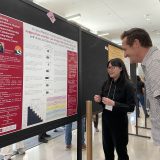
Technology and Healthcare Senior Lindsay Zumwalt shares her experience at the AIMed19 Conference
January 27, 2020
 My name is Lindsay Zumwalt and I am a senior molecular biology major here at Chapman University. I will be graduating in the spring with aspirations to attend medical school. Ultimately, I want to be a pediatric physician working to integrate technology into the healthcare field.
My name is Lindsay Zumwalt and I am a senior molecular biology major here at Chapman University. I will be graduating in the spring with aspirations to attend medical school. Ultimately, I want to be a pediatric physician working to integrate technology into the healthcare field.
With technological advances on the rise, I strongly believe the application of technology to health can have tremendous and wide-spanning effects. Technology has always been something that is intriguing to me. Through my research in Dr. Ogba’s computational chemistry lab at Chapman, I have seen first hand how powerful technology can be! I recently became interested in the tie between healthcare and technology when I spent the summer at the Children’s Hospital of Orange County (CHOC) as an intern with the Medical Intelligence and Innovation Institute (MI3) department. The internship was focused around innovations in healthcare as well as the integration of artificial intelligence into the field. This sparked my interest as I saw how tools like digital pupilometers are already being implemented into hospitals in order to improve the care for and outcomes of patients.
 Through this internship, I was encouraged to come up with an idea of my own and submit it to the AIMed19 conference. As a result, I was selected to present my idea to current physicians, data scientists, and others in the field. I based my abstract on a couple of current issues surrounding the therapy for mental health illnesses. Therapists are a beneficial resource for patients with mental illnesses, as therapy is inherently personalized. The issue is when these patients go home. Although patients are often taught strategies to help them at home, they do not always work. Someone may have a severe depressive episode or encounter a PTSD trigger late at night, and their coping strategies may fail when they cannot get into contact with their therapist. Everything else currently on the market targetted at this issue is either not customizable or does not form a sense of presence with the patient going through hard times. My idea to solve this problem is AVA (the Adaptable Virtual reality Avitar). This will be a customizable avatar that incorporates virtual reality, artificial intelligence, natural language processing, computer vision, and pattern recognition. A patient will be able to use it whenever they like. It has the ability to converse with the patient to help figure out what the problem is and to calm them down. Over time, it learns what has worked and what has not worked, what the patient likes to hear, and does not, and it continually improves upon itself. Finally, if the avatar sees or hears something of high concern, it will have the ability to call for help. This application of technology to the treatment of mental health illnesses will not only improve the quality of life for patients but also has the ability to save lives.
Through this internship, I was encouraged to come up with an idea of my own and submit it to the AIMed19 conference. As a result, I was selected to present my idea to current physicians, data scientists, and others in the field. I based my abstract on a couple of current issues surrounding the therapy for mental health illnesses. Therapists are a beneficial resource for patients with mental illnesses, as therapy is inherently personalized. The issue is when these patients go home. Although patients are often taught strategies to help them at home, they do not always work. Someone may have a severe depressive episode or encounter a PTSD trigger late at night, and their coping strategies may fail when they cannot get into contact with their therapist. Everything else currently on the market targetted at this issue is either not customizable or does not form a sense of presence with the patient going through hard times. My idea to solve this problem is AVA (the Adaptable Virtual reality Avitar). This will be a customizable avatar that incorporates virtual reality, artificial intelligence, natural language processing, computer vision, and pattern recognition. A patient will be able to use it whenever they like. It has the ability to converse with the patient to help figure out what the problem is and to calm them down. Over time, it learns what has worked and what has not worked, what the patient likes to hear, and does not, and it continually improves upon itself. Finally, if the avatar sees or hears something of high concern, it will have the ability to call for help. This application of technology to the treatment of mental health illnesses will not only improve the quality of life for patients but also has the ability to save lives.
After presenting my abstract, I was introduced to the owner of a startup that is currently working on something very similar to my idea which incorporates something called emotional intelligence. Since then, I have been able to conference call with this company and speak about internship opportunities!
At the conference, I also had the opportunity to network with some incredible people. Some of the highlights were a 23-year-old who made his own startup dental AI company that is already integrated all over the US. It is an app in which you can take a picture of the inside of your mouth and, by using AI, it can scan it for cavities, gum disease, and even oral cancer. I also spoke with someone who is part of a company called Jvion that uses huge data sets and the input of patient data (such as age, medical conditions, socioeconomic status) and AI to predict what that patient may be at higher than average risk for and is able to propose preventative measures for the care team to take. It is already being implemented in hospitals. For example, if a patient is more susceptible to postsurgery bedsores, a message will pop up on the screen for the nurse recommending that they turn the patient more times than the standard protocol. This form of preventative medicine is incredible, and I think has high hopes to aid with the US healthcare financial crisis. Finally, I got to see how virtual reality is being integrated into pre-surgery procedures for brain tumors. A normal brain scan can now be turned into a 3D image that can be viewed from a VR headset. This allows the physician to see the tumor from every angle, interact with it, and more before they even open up the patient.
This conference has opened my eyes to how powerful technology can be in a healthcare setting. I am now more excited than ever to be entering this field. I cannot wait until the day I am a physician and incorporating technology of my own into my practice.

